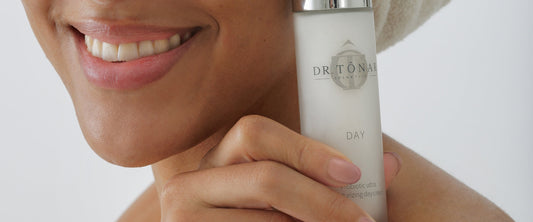Matcha is currently considered a real trend drink, which is said to have a lot of health-promoting effects. This raises the question of what exactly is in the green tea that makes the skin glow from within. Read more here about the benefits Matcha has on your skin health and whether the green trend drink lives up to its success.

Matcha, which traditionally comes from Japan, differs from normal green tea because the leaves are not brewed but ground into a fine powder. What makes it special is that the whole tea leaf is consumed with all its health benefits. Matcha therefore also contains many health-promoting ingredients, including numerous vitamins, amino acids and antioxidants.
Antioxidants
One of the main reasons why matcha is so good for the skin is its high antioxidant content. Matcha contains 10 times as many antioxidants as regular tea and about 60.5 times as many antioxidants as spinach. These act like little helpers that fight free radicals and the risk of skin damage. By neutralizing free radicals, fine lines and wrinkles can be reduced and the skin gets a radiant glow.

Healthy caffeine
Matcha contains L-theanine, an amino acid known for its calming effect. Combined with the caffeine from matcha, it creates a unique effect: a sustained energy boost without nervous restlessness. The L-theanine balances out the stimulating effect of the caffeine and ensures relaxation and improved concentration. Unlike coffee, which often causes a quick energy boost followed by a low energy level, matcha provides longer-lasting and balanced energy. This can promote blood circulation in the skin, which contributes to a healthy complexion and an improved supply of nutrients. It can also help reduce swelling and tighten the skin.

Vitamins
In addition to antioxidants and L-theanine, matcha is rich in various vitamins, including vitamin C and E. Vitamin C is an important component of collagen production, which is responsible for the elasticity and firmness of the skin. Vitamin E has an antioxidant and cell-protective effect and can therefore reduce skin damage caused by environmental influences. Green tea also contains vitamin A, B1, B2, B6 and essential trace elements such as calcium, zinc, copper and iron. Zinc has a particularly anti-inflammatory, antibacterial and wound-healing effect, which has a positive effect on acne.
Chlorophyll
The high proportion of chlorophyll in matcha improves the transport of oxygen to the cells, which stimulates cell division and the formation of important proteins and collagen. A cup of matcha a day can also stimulate digestion and help the body to eliminate toxins. The antioxidants and polyphenols contained in the tea also act as prebiotics and promote the growth of intestinal bacteria. A healthy gut has a positive effect on the skin. Skin blemishes in particular can be reduced and prevented.

The right matcha preparation
To enjoy matcha to the fullest, the correct preparation is crucial. Pro tip: The water temperature plays a major role. Hot water of around 70-80°C should be used and a matcha whisk to whip it into a foam. Matcha should not be prepared with boiling water, otherwise the sensitive ingredients such as vitamins and antioxidants will be destroyed and the taste will become bitter. It is also important to prepare it with a bamboo matcha whisk, as the ingredients can oxidize when prepared with metal tools, which affects the taste and nutritional value. The green tea powder can not only be drunk as a coffee alternative, but can also be mixed into smoothies or bowls. Chia pudding can also be refined well with matcha.

The trendy green drink lives up to its success. It has many health benefits. Its high concentration of antioxidants, vitamins and caffeine makes matcha a valuable superfood for the skin.




